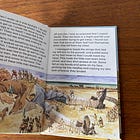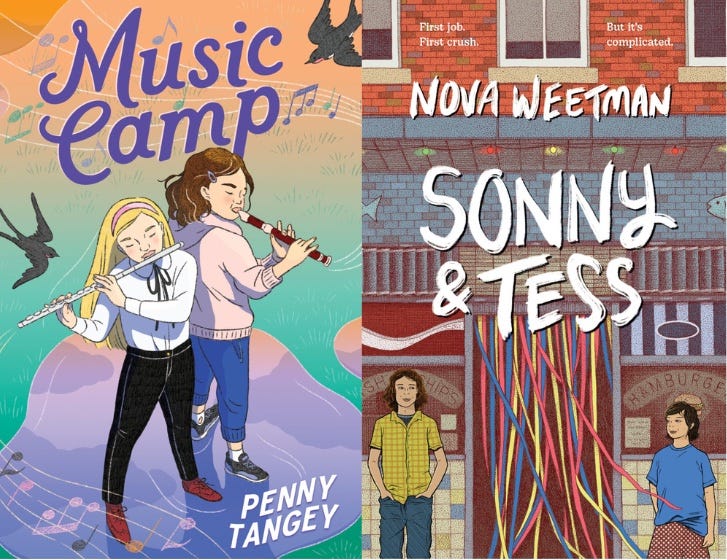The Minis Series
4 espresso shots about writing, reading or the book industry; and thoughts on two funny novels for children
Dear Reader,
Thank you for engaging with my Mistakes Series last month, in which I shared 5 of the mistakes I’ve made as a writer since my career began.
This month I’m sharing my Minis Series: 4 shorter posts about aspects of writing, reading or the book industry that I initially sent out to paid subscribers, and am now opening up to everyone. There’s a piece on the theory of omission in writing, one on my writer’s block denial, one on naming fictional characters, and one on the standard indignities of being a writer. Take your pick.
(If they have magically re-locked themselves, you can let me know by reply and I will fix it — seems to be a Substack glitch.)
1. 600 words on the art of omission
(ending with some witty encouragement by the author Barbara Comyns for anyone who’s writing something that they know others may scorn)
2. The day I couldn’t answer a question about how to deal with writer’s block, and what I came up with in hindsight
3. I dub thee: Harper, Fanny, Adie and Eliza. Ruminating on the joys and pitfalls of naming characters
4. On the standard indignities of being a writer, and how an illustration fondly remembered from my childhood says it all
The Art and Variety of Humour
There was an interesting post on Instagram recently by children’s author Adrian Beck asking if funny books for young people get what they deserve in terms of awards, praise, or general recognition. A few years ago I might have said immediately that they do not (though as a former bookseller I do think they receive appropriate shelf space). But I think if we look at the CBCA Notables and Shortlists of the last two years — even if that’s a flawed process, as all awards naturally are, I’m not sure there’s a better litmus test in this country — funny books are now front and centre recognition-wise.
To grab a recent selection of books honoured by the Children’s Book Council in 2024/5: the cheeky humour of To and Fro by Anton Clifford-Motopi, the Dahl-esque humour of H. Hayek (Huda & Me), the mishaps of Aggie Flea by Tania Ingram, the funny antics of Fluff by Matt Stanton, the highly flappable Real Pigeons by Andrew McDonald and Ben Wood, and the energising work of Maryam Master in Laughter is the Best Ending.
But to give the original suggestion its due: the year before that, the CBCA younger shortlist didn’t have two giggles to rub together. I’d love to do a full and proper analysis but I’m supposed to be editing a novel . . .
Commercially we know that funny books are everything. In Australia I can use shorthand to list some books that dominate the conversation: treehouse, weirdo, pigeons, twigs, bad guys, worst week ever, and so on. The backbone of junior fiction is humour.
Humour is so varied and subjective. What I find hysterical you may find puzzling, and vice versa. There’s also a difference between a very young child’s ability to generate humour versus their ability to grasp the humour that someone else has made. Anyone who has sat through a six year old’s learner-jokes around the dinner table when they first “discover” humour will tell you that children are not really very funny except by virtue of being so incredibly unfunny that you end up laughing along with them as they fumble a Knock-Knock or a What do you call a . . . There are exceptions to this, of course: those little ones with a suspiciously dry humour and deadpan delivery that makes you wonder if they’re the reincarnation of Peter Sellers or Victoria Wood. But by about ten, a lot of kids have become seriously and broadly funny in their own right. Split your sides funny. Not all of them, it’s true, but in my experience ten and up is a big Becoming Genuinely Hilarious stage. And long before then, kids of all ages can grasp the humour we make for them.
And so writers and illustrators make them all kinds of funny books. From the wacky, joyful, slapstick and silly, to the driest of the dry. I read a couple of novels recently that I’d love to recommend to you as hilarious in different ways.
The first is Music Camp by Penny Tangey, in which 11 and 12 year old music students go on a camp and get stranded there because of a crisis weather event. The story’s climax is about torrential rain but the humour is wonderfully dry.
Personally, I laugh my socks off in every Penny Tangey novel. What perplexes me a little is why her jackets never have any ‘this is a funny book’ code on them. Stay Well Soon, for instance, has a melancholy girl on the front of it — and indeed there is a sadness in this story — but there is also a lot of humour. The same with As Fast As I Can. These are brilliant comedies. The dry kind, the not-trying-too-hard kind (or not seeming to) that many kids in late-primary get.
In Music Camp, readers are treated to Penny Tangey’s trademark observational, self-deprecating (without being self-hating) humour, for when you’re developing that muscle of being able to laugh at yourself — very useful for getting over embarrassing pre-teen situations. It’s slightly bitter, slightly sweet. It’s the comedy of brutal truth, and I love this kind of funny book.
The second book is Sonny & Tess by Nova Weetman. And the comedy in this story hits in a different place. It’s that joyful, bubbling-up in your chest variety that goes so well with romance — for this story is about a very early, very innocent, absolutely beautifully rendered teenage crush. There are laugh-out-loud moments — of course there are, having a crush feels very silly and embarrassing, after all! — but I think more than anything I’d describe the feeling of reading this book as having a persistent case of gladdened heart. You’ll put the book down to make a cup of tea and find that your face is fixed in a smile. A mood-lifting experience made of hundreds of brilliant decisions by the author.
I hope that books like Music Camp (for ages 9+) and Sonny & Tess (for ages 11+) will help to ensure that it isn’t just junior fiction that has humour as its backbone, but also middle-grade and young-adult fiction. Big kids deserve a laugh, too.
Thank you for reading.
If you enjoyed this and you’d like to support me in some way, I’d love it if you’d consider leaving a review of one of my books or sharing this newsletter with a friend.











Thanks so much for writing this. I've just started reading Sonny and Tess with my daughter and I completely agree with what you've said - I'm gladdened already and it's very nice to to have Music Camp compared alongside it. The reason my book covers aren't funny-coded varies for each one. For Music Camp I decided I'd rather people be pleasantly surprised that it's amusing in places than disappointed it's not as funny as they'd been led to believe by the cover font! Trying to exceed expectations by kicking the bar down lower is a Tangey family trait (I shouldn't admit to that as it undermines my strategy)